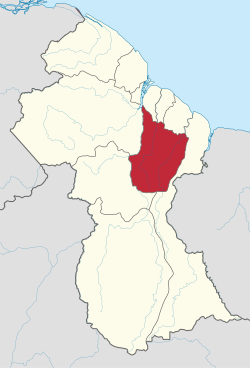Upper Demerara-Berbice
Upper Demerara-Berbice Region 10 | |
|---|---|
Administrative Region | |
 Map of Guyana showing Upper Demerara-Berbice region | |
| Country | Guyana |
| Regional Capital | Linden |
| Area | |
• Total | 17,040 km2 (6,580 sq mi) |
| Population (2012 census) | |
• Total | 39,452 |
| • Density | 2.3/km2 (6.0/sq mi) |
| [1] | |
Upper Demerara-Berbice (Region 10) is a region of Guyana, bordering the regions of Essequibo Islands-West Demerara, Demerara-Mahaica and Mahaica-Berbice to the north, the region of East Berbice-Corentyne to the east, and the regions of Potaro-Siparuni and Cuyuni-Mazaruni to the west.
It contains Guyana's second largest city, Linden, with notable villages including Ituni, Kwakwani, Kurupukari, Rockstone and Takama.
Kimbia is the first training center to house the Guyana National Service. The Pioneer Corps was started in 1974, with the establishment of Kimbia Center on the Berbice River.[2]
Population
The Government of Guyana has administered three official censuses since the 1980 administrative reforms, in 1980, 1991 and 2002.[3] In 2012, the population of Upper Demerara-Berbice was recorded at 39,452 people.[4] Official census records for the population of the Upper Demerara-Berbice region are as follows:
- 2012 : 39,452
- 2002 : 41,112
- 1991 : 39,608
- 1980 : 38,641
Communities
(including name variants):[5]
References
- ^ Macmillan Publishers (2009). "Administrative Regions - 8, 9 and 10". Macmillan Junior Atlas: Guyana. Oxford: Macmillan Caribbean. p. 37. ISBN 9780333934173.
- ^ "The Guyana National Service". Stabroek News. Retrieved 19 August 2020.
- ^ Beaie, Sonkarley Tiatun (19 September 2007). "Chapter 3: National Redistribution and Internal Migration" (PDF). 2002 Population and Housing Census - Guyana National Report. Bureau of Statistics. p. 51. Archived from the original (PDF) on 17 February 2012. Retrieved 29 August 2012.
- ^ Beaie, Sonkarley Tiatun (19 September 2007). "National Population Trends: Size, Growth and Distribution" (PDF Download). 2002 Population and Housing Census - Guyana National Report. Bureau of Statistics. p. 25. Retrieved 29 August 2012.
- ^ "2012 Population by Village". Statistics Guyana. Retrieved 8 December 2021.

